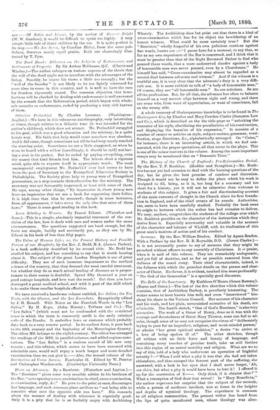Hints on, Advocacy. By a Barrister. (Waterlow and Layton.)— The
" Barrister " gives some very sensible advice to his brethren of the Bar, "as to opening a case, examination-in-chief, cross-examination, re-examination, reply, &c." He goes to the point at once, discourages fine language, and such common-place artifices as "not being able to conceive what case the opposite side can have." His counsels about the manner of dealing with witnesses is especially good. Only it is a pity that he is so foolishly angry With Archbishop Whately. The Archbishop does but point out that there is a kind of cross-examination which has for its object the bewildering of an honest witness. What could be more certainly true ? But the- " Barrister," wholly forgetful of his own judicious ca.uticns against fine words, bursts out :—"I pause here for a moment, to say that, BO far as my own experience of the Bar is concerned, and I think that it must be greater than that of the Right Reverend Father in God who penned these words, that a more undeserved slander against a body of honourable men was never penned, even by a Churchman." He- himself has said, "Cress-examination may almost be regarded as a mental duel between advocate and witness." And if the witness is a truthful one, it is very clear that the advocate's duty is a very diffi- cult one. It is mere rubbish to talk of "a body of honourable men." Of course, they are "all honourable men." So are solicitors. So are all the professions. But, for all that, the advocate has often to balance himself on a very narrow edge between right and wrong, and there are some who, from want of appreciation, or want of conscience, fall on the wrong side.


































 Previous page
Previous page